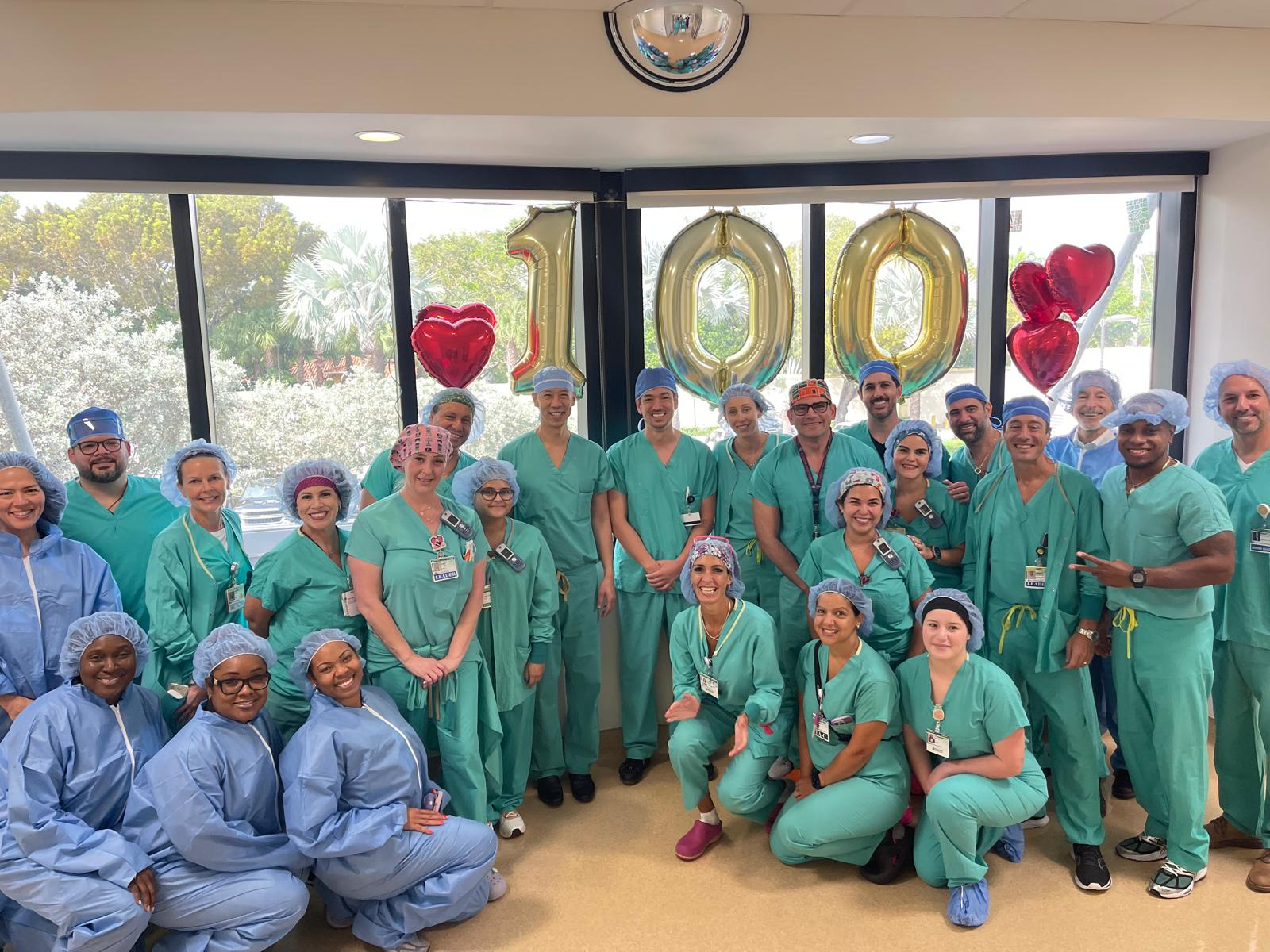

In a significant achievement for cardiac care in Florida, a world-renowned surgeon has successfully completed his 100th robotic cardiac surgery at Baptist Health Miami Cardiac & Vascular Institute. This milestone, reached just months after the program's launch in January 2025, reaffirms and expands the Institute’s role as a leader in minimally invasive heart procedures, with the most robotic cardiac surgeries in the state of Florida.
Makoto Hashimoto, M.D., cardiac surgeon at Baptist Health Miami Cardiac & Vascular Institute,and professor and director of robotic cardiac surgery at Florida International University Herbert Wertheim College of Medicine was recruited from Japan to lead and direct the program, expanding the Institute’s global talent to serve the local community. His accomplishment signals a new era for heart surgery in the region, offering patients safer and more precise treatment options.
"In January of this year, we launched the robotic cardiac surgery program at Baptist Health, and we have now reached 100 cases," Dr. Hashimoto explained. "This number objectively demonstrates that our hospital performs the highest volume of robotic cardiac surgeries in the state of Florida."
A Milestone for Florida and Beyond
This achievement is not just about the 100th surgery — it's about building a foundation of excellence and trust locally, statewide and beyond, according to Tom C. Nguyen, M.D., FACS, FACC, chief medical executive and Barry T. Katzen Endowed Chair at the Institute, where he is also the director of Minimally Invasive Valve Surgery.
"I would say this is a huge milestone,” said Dr. Nguyen. “We’re the largest robotic program in Florida, and the program will be an important backbone for our future strategic plan of becoming world class. I would highlight that we’ve done a lot and the best is yet to come. "
For Dr. Hashimoto, this achievement is deeply personal and affirms the team's direction. "Reaching this milestone of 100 cases has strengthened our confidence that our program will continue to lead this field in Florida," he said.
Dr. Hashimoto's experience is extensive. This is the second time he has built a leading robotic cardiac surgery program from the ground up, having previously done so in Japan. The rapid success at the Institute underscores the powerful combination of his skill and the dedicated team at the Institute.

Dr. Tom Nguyen, Dr. Makoto Hashimoto, and Dr. John Diaz, with the robotic surgery team at Baptist Health South Miami Hospital.
The Team Behind the Technology
Robotic surgery requires a highly coordinated team of surgeons, nurses, anesthesiologists, and technicians. Robotic surgery requires a highly coordinated team of surgeons, nurses, anesthesiologists, and technicians. This is a highly specialized field, and cardiac robotic procedures are still the minority in the U.S. Although Dr. Hashimoto is leading the way in South Florida, he is quick to credit the collective effort of his team that makes each procedure a success.
"Robotic surgery is not something that can be accomplished by one surgeon alone—it is a team-based approach that brings together collective expertise to provide the best, most minimally invasive treatment for each individual patient," Dr. Hashimoto explains. "I am truly proud to be working with the outstanding team at Baptist and to be part of this evolving field."
This collaborative approach ensures that every aspect of patient care is meticulously managed, from pre-operative planning to post-operative recovery. The synergy between Dr. Hashimoto's experience and the Institute's skilled team has been a key driver of the program's excellent outcomes.
Gynecologic oncologist John P. Diaz, M.D., is medical director of Robotic Surgery and chair of the Robotics and Innovations in Surgery Subcommittee at Baptist Health South Florida. Dr. Diaz also serves as chair of the Department of Obstetrics and Gynecology at Florida International University Herbert Wertheim College of Medicine.
How Robotic Cardiac Surgery Works
Robotic-assisted surgery represents a major leap forward from traditional open-heart surgery. Instead of a large incision through the breastbone, the surgeon makes a few small incisions between the ribs. A sophisticated robotic system, with tiny instruments and a high-definition 3D camera, is then inserted.
The surgeon sits at a console, controlling the robotic arms with precision. This technology enhances the surgeon's dexterity, allowing for steadier movements and a greater range of motion than the human hand. The magnified, high-definition view provides unparalleled detail of the heart and surrounding tissues.
The benefits for patients are significant. They typically experience:
- Less pain and scarring
- Hospital stay of only 2 to 3 days after surgery
- Reduced blood loss
- Lower risk of infection
- Shorter hospital stays
- Faster recovery and return to normal activities
Advancements Enabling a New Standard of Care
The growth of robotic cardiac surgery has been propelled by major technological advancements. The current fourth-generation robotic system is a key reason for the procedure's increased safety and precision.
"The most significant advancement is that we are now able to use the fourth-generation robot," Dr. Hashimoto said. "With the technology we use, robotic cardiac surgery can be performed safely and with great precision. As a result, robotic surgery is gaining worldwide attention in the field of cardiac surgery."

